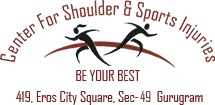Reverse Shoulder Replacement
post by Dr Raman Kant Aggarwal on July 5th, 2019Shoulder is an important joint in our body. Thanks to its unique ball and socket configuration, it allows for a range of motions. In a healthy shoulder, the humerus’ ball is held in the shoulder socket by rotator cuff which is a group of tendons and several muscles. When rotator cuff is torn, the shoulder wears out leading to shoulder arthritis. In cases where the patient has shoulder arthritis with a large tear in the rotator cuff, reverse shoulder replacement is suggested (over conventional shoulder replacement).

The conventional shoulder replacement relies on rotator cuff for the movement as it involves fitting the plastic cup to the shoulder socket and a metal ball to the top of humerus. But in patients with cuff tear anthropathy or large rotator cuff tear, the rotator cuff muscles cannot function. Therefore, metal ball is fixed into the socket and the cup is attached to upper end of humerus.
My mother was under my care for three years when she developed tears in her rotator cuff and I kept on giving her steroid injections until one day her arm got stuck in extreme pain. Not knowing what to do as I had never seen this condition, I consulted some doctors in Delhi and found out nobody knew anything about it. I knew Dr Ashok Rajgopal, the famous knee surgeon and he did a small surgery on my mother’s shoulder to relieve the agony. That is when he inspired me to take up the challenge of specialising in shoulder surgery in the UK and come back and help the millions of people in our country. And that is what I pursued from 2004-2009 and became a shoulder surgeon, after having spent 17 years doing fractures, knee and hip replacement surgeries in India and UK!
Candidates for reverse shoulder transplant
You will be recommended the reverse shoulder replacement by the doctor in following cases:
- Cuff tear arthropathy
- A large rotator cuff tear that cannot be repaired
- Complications from previous shoulder replacement surgery
- A complicated injury to the shoulder joint
- Severe dislocation of the shoulder
- Difficulty with shoulder movements either up-down or sideways or both
- A tumour of the shoulder joint
- Fractured shoulder
Preparing for the surgery
Before starting with the surgery process, the doctor or the clinic staff will perform few basic tests to check your health status and readiness for the operation. This includes complete physical check-up and discussion with doctors in case of any chronic illness.
Followed by this, doctors will ideally discuss your medical history and check with you if you are currently on medications. You may be asked to stop taking blood thinners or over-the-counter medications that can cause excessive bleeding at least for a couple of weeks before the surgery
It is also important for you to understand the duration of the treatment and the recovery process in order to prepare better. Ensure that you have an adequate support at home post the surgery to assist you with basic activities such as bathing, dressing, cooking, etc. as you may be able to perform only limited shoulder movements for few weeks.
Reverse shoulder transplant surgery process
The reverse shoulder transplant is performed at hospitals and will typically require you to get admitted for the operation. Before starting with the operation, the surgeon will observe the shoulder and discuss the possibility of complications with you. The complications, if any include infection, bleeding or nerve damage.
Dr. Raman Kant Aggarwal has 25 years of experiance in reverse shoulder replacement in Gurgaon is highly technical and requires skills doctor. The surgery will then begin with the hospital staff giving you a local or general anaesthesia. The doctor will create an incision into your shoulder bone, either on the side or on the top. The damaged part will then be removed to be replaced with artificial components. Therefore, basically the metal ball will be fixed into the socket of your shoulder while the plastic cup will be fitted into the upper arm bone i.e. humerus.
The entire procedure for reverse shoulder replacement takes around two hours. You can consult the nearby orthopaedic surgeon in Gurgaon to know more.
Recovery
Once the replacement surgery is over, you will be discharged from the hospital in a couple of days. During this period, you will be given pain medications to manage the pain. Non-steroidal anti-inflammatory drugs or local anaesthetics will be prescribed as pain relievers. You may also be given antibiotics for few days to reduce the chances of infection post the surgery.
You would need to wear a sling for your affected arm for a couple of weeks.
Conclusion
The hospital will recommend specific physiotherapy in form of motion exercises for a certain time. Follow the routine for faster healing process and increased mobility. At the same time, do not overdo the physical activity or stress your shoulder too much during the recovery process.
